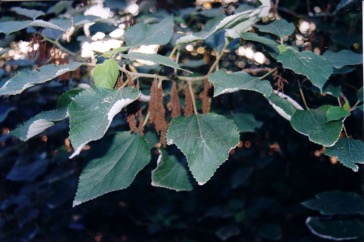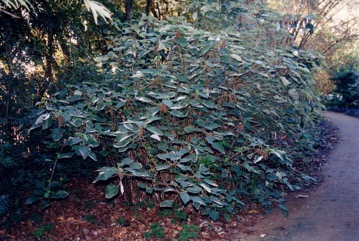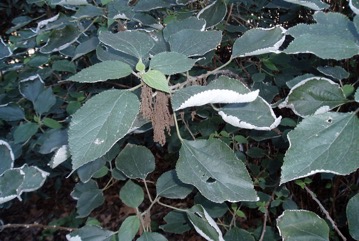Ramie

A tropical and subtropical plant. The plant grows best in warm moist climates. It needs rich well drained soil. It can grow in part shade. It grows on the edges of forests between 200-1,700 m above sea level. Melbourne Botanical gardens. In Sichuan and Yunnan.
Also known as:
Ban, Bela kopriva, China Grass, Gon, Kankura, Kya-sha, Lashen, Rami, Rhea
Synonyms
- Boehmeria tenacissima Gaudich.
Edible Portion
- Root, Leaves, Seeds - oil, Flowers, Stem
Where does Ramie grow?
Found in: Africa, Asia, Australia, Bangladesh, Bhutan, Brazil, Cambodia, China, Dominican Republic, East Africa, Fiji, Grenada, Guam, Haiti, Hawaii, Himalayas, India, Indochina, Indonesia, Japan, Korea, Laos, Malaysia, Mozambique, Myanmar, Nepal, Norfolk Island, North America, Northeastern India, Pacific, Papua New Guinea, PNG, Philippines, Rwanda, Sao Tome and Principe, SE Asia, Sikkim, Slovenia, South America, Taiwan, Thailand, United States, Vietnam, West Indies
Notes: The plant is often grown for the fibres. There are about 100 Boehmeria species. They grow in the tropics and subtropics. It is used in medicine.
Growing Ramie
Cultivation: It can be grown from seed. It is more commonly grown from cuttings of the rhizome. Sections 15-25 cm long are planted at a depth of 5-8 cm. Suckers and stem cuttings can also be used.
Edible Uses: The roots are eaten after boiling and peeling. Oil extracted from the seeds is used for cooking. The leaves are cooked and eaten. They are also used as a dye to make black rice cake.
Nutrition Info
per 100g edible portion| Edible Part | Energy (kcal) | Protein (g) | Iron (mg) | Vitamin A (ug) | Vitamin c (mg) | Zinc (mg) | % Water |
|---|---|---|---|---|---|---|---|
| Leaves | - | - | - | - | - | - | |
| Root | - | - | - | - | - | - |
Ramie Photos



References
Ambasta, S.P. (Ed.), 2000, The Useful Plants of India. CSIR India. p 76
Bircher, A. G. & Bircher, W. H., 2000, Encyclopedia of Fruit Trees and Edible Flowering Plants in Egypt and the Subtropics. AUC Press. p 60
Burkill, I.H., 1966, A Dictionary of the Economic Products of the Malay Peninsula. Ministry of Agriculture and Cooperatives, Kuala Lumpur, Malaysia. Vol 1 (A-H) p 346
Cobley, L.S. (rev. Steele, W.M.) 2nd Ed., 1976, An Introduction to the Botany of Tropical Crops. Longmans. p 278
Flora of China @ efloras.org Volume 5
Flora of Australia, Volume 3, Hamamelidales to Casuarinales, Australian Government Publishing Service, Canberra (1989) p 85
Flora of Australia Volume 49, Oceanic Islands 1, Australian Government Publishing Service, Canberra. (1994) p 70
Hibbert, M., 2002, The Aussie Plant Finder 2002, Florilegium. p 44
Hu, Shiu-ying, 2005, Food Plants of China. The Chinese University Press. p 363
Hwang, H., et al, 2013, A Study on the Flora of 15 Islands in the Western Sea of Jeollanamdo Province, Korea. Journal of Asia-Pacific Biodiversity Vol. 6, No. 2 281-310
Kuo, W. H. J., (Ed.) Taiwan's Ethnobotanical Database (1900-2000), http://tk.agron.ntu.edu.tw/ethnobot/DB1.htm (As var. tenacissima)
Lim, T. K., 2015, Edible Medicinal and Non Medicinal Plants. Volume 9, Modified Stems, Roots, Bulbs. Springer p 16
Liu, Yi-tao, & Long, Chun-Lin, 2002, Studies on Edible Flowers Consumed by Ethnic Groups in Yunnan. Acta Botanica Yunnanica. 24(1):41-56
Martin, F.W. & Ruberte, R.M., 1979, Edible Leaves of the Tropics. Antillian College Press, Mayaguez, Puerto Rico. p 77, 223
Plants for a Future database, The Field, Penpol, Lostwithiel, Cornwall, PL22 0NG, UK. http://www.scs.leeds.ac.uk/pfaf/
Plants of Haiti Smithsonian Institute http://botany.si.edu/antilles/West Indies
Purseglove, J.W., 1968, Tropical Crops Dicotyledons, Longmans. p 620
Rashid, H. E., 1977, Geography of Bangladesh. Westview. p 319
READ
Recher, P, 2001, Fruit Spirit Botanical Gardens Plant Index. www.nrg.com.au/~recher/ seedlist.html p 4
Smith, A.C., 1981, Flora Vitiensis Nova, Lawaii, Kuai, Hawaii, Volume 2 p 239
Smith, P.M., 1979, Ramie, in Simmonds, N.W., (ed), Crop Plant Evolution. Longmans. London. p 323
Sukarya, D. G., (Ed.) 2013, 3,500 Plant Species of the Botanic Gardens of Indonesia. LIPI p 592
Tanaka, Y. & Van Ke, N., 2007, Edible Wild Plants of Vietnam. Orchid Press. p 140
Terra, G.J.A., 1973, Tropical Vegetables. Communication 54e Royal Tropical Institute, Amsterdam, p 29
Voy. Uranie 12:499. 1830
Williams, C.N., Chew, W.Y., and Rajartnam, J.A., 1989, Tree and Field Crops of the Wetter Regions of the Tropics. Longman, p 87
World Checklist of Useful Plant Species 2020. Royal Botanic Gardens, Kew
Xu, You-Kai, et al, 2004, Wild Vegetable Resources and Market Survey in Xishuangbanna, Southwest China. Economic Botany. 58(4): 647-667.